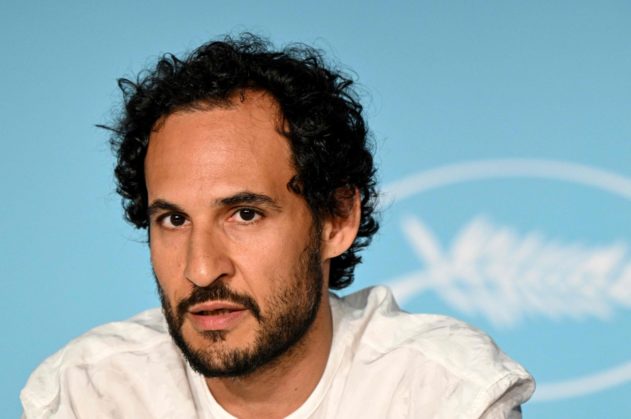CANNES FESTIVAL: Twenty years after the serial killings in Mashhad, Iran, “HOLY SPIDER”
CANNES, France — Lately, it seems there’s been a change in attitude among some directors in the new generation of Persian filmmakers: through their films they’re more willing to show more, more of the dark underbelly of the beast. In films like “Tehran Taboo,” “A Girl Walks Home Alone at Night,” “Just 6.5,” themes and motifs, two shades darker than before, are explored: Iranian society has problems, much like any Western society, and the new generation of filmmakers is a lot more willing to show the damage front and center: drugs, addiction, violence, sex, prostitution are of a piece with the repressive and hypocritical functioning of an Islamic theocracy.
Did drugs, violence and prostitution exist when Kiarostami directed “A Bowl of Cherry,” (a film about suicide) or Panahi made “Offside” (a film about girls being banned from soccer games)? They likely did. Islamic rule, instituted in Iran in 1980, has made liars out of half of the country, while the other half prays five times a day and toes the line. In order to avoid problems with the state, many Iranians lead double lives, their private life and their public one, and never the twain shall meet.
Yet, sex work, illegal in the West, but an offense that carries heavy penalties under an autocratic regime, runs full throttle in all Iranian cities’ shadier outer rings and parks. Just in the city of Mashhad upwards of 5,000 regular sex workers have been counted, according to a study that was done by the city of Mashhad a few years ago. And it takes them between one and three minutes to find a john.
Twenty years ago, more precisely, is when what became known as the spider crimes occured. Saeed Hanaei, a Mashhad, Iran-based vigilante and a pious Islamist who fought in the Iran-Iraq war, took it upon himself to cleanse the city of its “impure” elements. He would ride on a motorcycle and lure sex workers to his house where he would strangle them. This inspired the media to call him the spider killer. He would ultimately kill 16 sex workers, be arrested and put to death by hanging.
Ali Abbassi, 41, is a Danish-Iranian filmmaker who was last in Cannes in 2020 to present a film called “Border” in the non-competition section.
“Holy Spider” is told from the point of view of both a journalist, played to a T by Zahra Amirebrahimi, an actress with a long list of theater, TV and film roles and one of the great actor discoveries of this Cannes Festival, and the killer, played by actor Mehdi Bajestani, handsome and charismatic, just another family man.
It’s a wager, to show the killer’s point of view. Murderers, especially those moved by their faith, are one-dimensional, they have a higher calling and nothing, or no one, will stop them from accomplishing their mission. Give such a predictable individual this much screen time in your movie and you run the risk of smothering the exciting part, the police procedural, the investigation that Ms. Rahimi (Amirebrahimi) is conducting for her newspaper, interviewing people, checking in with her editor, attempting to get acquainted with an indifferent police captain for support, the phone calls, the clues, the visits. Not so here. Abassi’s screenplay and directorial choices work and the resulting film, full of scenes of mayhem, horror and sadness and the determined search for the serial killer, is nerve-wrecking until the end. Three girls are killed under our very eyes and it’s brutal, the vicious realism of a serial killer operating in Mashhad’s underworld searing the mind.
“I was living in Iran at the time of the killings. In that country, unless five to seven people are killed, they don’t talk about it on the (Iran’s state-controlled) news.”
As the killings went on, back in 2000, what struck Abbasi, as he followed the events in the news, was how Iranians supported the killer. “This was not the story of some twisted guy but the story of a killer society.”
His project to make a film out of the spider killings began over four years ago, but although the event is very much Iran-based, the film could not be shot in that country.
In an attempt to secure the proper permits, Abbassi went to the ministry of Culture and Islamic Guidance, describing how he shared a cup of tea (Iran’s social lubricant) with them. He presented the script, minus a few touchy elements, and was ready to make compromises, that is, to shoot the film within the context of censorship. “The compromises I was ready to accept seemed fair to me.” They responded by saying what a great honor it was for them that he had come back to Iran to make a movie, that he was a great filmmaker and that we’ll be in touch.
Abbasi got the follow-up call one year later, at which point they asked him in again. For more tea. As Abbasi explained during the press conference for the film, another tea invitation means there’s no approval coming, they’re just stalling.
“Spider” was produced by Jacob Jarek, known for having produced “Only God Forgives” by Nicholas Winding Refn in 2013. Jarek toured several countries for location scouting, ultimately settling on Jordan as the shooting location, after the production encountered similar permit problems in Turkey, which was meant as first alternative location if Iran was a no-go.
Abbasi cites David Lynch and Bunuel as influences, Italian cinema. But he emphasized, “living in Iran, breathing that atmosphere, to know that Iranian reality, we finish by knowing that we have a specific culture, we have a cinematographic culture, and that’s what inspires me more than anything.”
This film is being shown in the competition section.
(featured image: Zahra Amirebrahimi in “Holy Spider”)
news via inbox
Nulla turp dis cursus. Integer liberos euismod pretium faucibua



